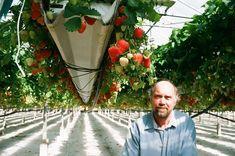
A new glasshouse strawberry variety called Sasha has been so successful under trial that Sainsbury’s is eager to take all the fruit being grown this year by Wallings Nursery, near Dedham, Essex.
With the largest commercial production of the fruit, Christopher Batchelor is growing 25,000 plants on table tops - about a quarter of his crop - which will account for 250,000 250g punnets. If the success continues, volumes could increase by 50 per cent next season.
The fruit is being marketed through Mack Multiples, which has a share in the five-hectare nursery after a management buy-out last year.
Other growers are also showing interest in the variety. Paul Roberts of Ashdown Nurseries, Ardleigh, is supplying Tesco through Berry Gardens.
Sasha was bred by East Malling Research, and the propagation and commercial rights belong to Meiosis. Plants are available from Hargreaves Plants and Woods Nursery Plants. Sarah Troop of Meiosis said the fruit’s parents are varieties EM881 and Eros, which were bred respectively from a combination of Rosie and Marmalada and Elsanta and Allstar.
Unveiling the variety at a recent open day, Rupert Hargreaves, commercial director of Hargreaves Plants, believes that it offers the first real challenge to Elsanta and Sonata, the two most popular varieties under glass.
He said: “Trials have shown that Sasha produced 10 per cent more Class I fruit than Elsanta and has a better shelf life. Its berries are uniformly larger, with fruit above 35mm recorded at 62 per cent, compared with 42 per cent for Elsanta.
“Against Sonata there is a 22 per cent higher yield. It also supports a longer picking season than either. Picking this year began in mid-April and will extend for eight to nine weeks.”
As well as fulfilling the multiples’ criteria for colour, taste, shape and size, Sasha’s attraction for producers is that the combination of low density planting and high yields can increase profitability, easing pressure on margins. Hargreaves estimates that this variety could return an extra £30,000 per hectare.
An application for Plant Variety Rights is currently being processed. The two propagators are also reviewing plans for next year to introduce the newcomer across the Channel in the Netherlands, Belgium and France.






No comments yet